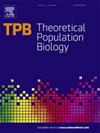A stochastic field theory for the evolution of quantitative traits in finite populations
IF 1.3
4区 生物学
Q4 ECOLOGY
引用次数: 0
Abstract
Infinitely many distinct trait values may arise in populations bearing quantitative traits, and modeling their population dynamics is thus a formidable task. While classical models assume fixed or infinite population size, models in which the total population size fluctuates due to demographic noise in births and deaths can behave qualitatively differently from constant or infinite population models due to density-dependent dynamics. In this paper, I present a stochastic field theory for the eco-evolutionary dynamics of finite populations bearing one-dimensional quantitative traits. I derive stochastic field equations that describe the evolution of population densities, trait frequencies, and the mean value of any trait in the population. These equations recover well-known results such as the replicator-mutator equation, Price equation, and gradient dynamics in the infinite population limit. For finite populations, the equations describe the intricate interplay between natural selection, noise-induced selection, eco-evolutionary feedback, and neutral genetic drift in determining evolutionary trajectories. My work uses ideas from statistical physics, calculus of variations, and SPDEs, providing alternative methods that complement the measure-theoretic martingale approach that is more common in the literature.
有限种群数量性状演化的随机场理论。
在具有数量性状的种群中可能出现无限多不同的性状值,因此对其种群动态建模是一项艰巨的任务。虽然经典模型假设人口规模固定或无限,但由于出生和死亡中的人口噪声而导致总人口规模波动的模型,由于密度依赖的动态,其行为在质量上可能与恒定或无限人口模型不同。本文提出了具有一维数量特征的有限种群的生态演化动力学的随机场理论。我推导了随机场方程,描述了种群密度、性状频率和种群中任何性状的平均值的演变。这些方程恢复了众所周知的结果,如复制-突变方程、Price方程和无限种群极限下的梯度动力学。对于有限种群,这些方程描述了自然选择、噪声诱导选择、生态进化反馈和中性遗传漂变之间复杂的相互作用,以确定进化轨迹。我的方法使用了统计物理、变分演算和spde的思想,提供了补充文献中更常见的度量理论鞅方法的替代方法。
本文章由计算机程序翻译,如有差异,请以英文原文为准。
求助全文
约1分钟内获得全文
求助全文
来源期刊

Theoretical Population Biology
生物-进化生物学
CiteScore
2.50
自引率
14.30%
发文量
43
审稿时长
6-12 weeks
期刊介绍:
An interdisciplinary journal, Theoretical Population Biology presents articles on theoretical aspects of the biology of populations, particularly in the areas of demography, ecology, epidemiology, evolution, and genetics. Emphasis is on the development of mathematical theory and models that enhance the understanding of biological phenomena.
Articles highlight the motivation and significance of the work for advancing progress in biology, relying on a substantial mathematical effort to obtain biological insight. The journal also presents empirical results and computational and statistical methods directly impinging on theoretical problems in population biology.
 求助内容:
求助内容: 应助结果提醒方式:
应助结果提醒方式:


